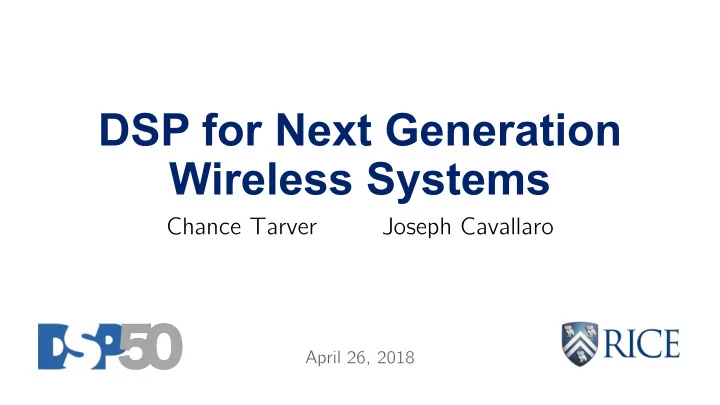

DSP for Next Generation Wireless Systems Chance Tarver Joseph Cavallaro April 26, 2018
Where we’re going: • Massive device to device connectivity: • Sensor Networks • Internet-of-Things • Body Area Networks • Mobile Broadband over 100 Gpbs
Challenges Future Directions • Densification • New spectrum resources in mmWave and beyond • Increased spectrum congestion • Massive MIMO • New ultrawideband • Coexistence aware waveforms waveforms stressing assisted by predistortion the physical layer
Our Unique Approach DSP / Algorithm Architecture Testbed Co-design
Massive Multi-User MIMO Systems Uplink Downlink Simultaneously Hundreds of MIMO transmitting to base station Base tens of users on Station antennas the same frequency Record breaking spectral efficiency
I/O Bottlenecks . . . RF RF RF RF RF RF . . . equalizer equalizer estimation channel decoder decoder
Decentralized Baseband Processing Split the base station antennas into clusters with fewer antennas.
Decentralized Baseband Processing • Alleviates interconnection and computation bottlenecks • Realizes efficient, modular and scalable baseband processing • Achieves competitive (or equal) performance to centralized methods
R econfigurable E co-system for N ext- generation E nd-to-end W ireless • Develop world’s first fully programmable and observable wireless radio network. • Wireless research and development community will be able to test diverse ideas and concepts. • PAWR. More than 28 private-sector companies from US wireless industry
Predistortion for Power Amplifiers Power Amp
Predistortion for Power Amplifiers Power Amp
Predistortion for Power Amplifiers Power Amp ? x(t) ⋅ G → y(t)
PA Output Power PA Input Power
PA Saturates PA Output Power PA Input Power
Original TX signal 0 No DPD -10 -20 -30 PSD -40 -50 -60 -60 -40 -20 0 20 40 60 Frequency (MHz)
Digital Predistortion (DPD) DPD Power Amp Application - DPD Learning
Digital Predistortion (DPD) DPD Power Amp Application - DPD Learning
Original TX signal 0 No DPD With DPD -10 -20 -30 PSD -40 -50 -60 -60 -40 -20 0 20 40 60 Frequency (MHz)
Conclusions DSP / Algorithm • Enabling massive device driven connectivity • Codesign between algorithms and architectures Architecture is necessary to meet challenges in next generation wireless systems Testbed Acknowledgments: Kaipeng Li Joseph Cavallaro Christoph Studer Rice University Rice University Cornell University
Recommend
More recommend